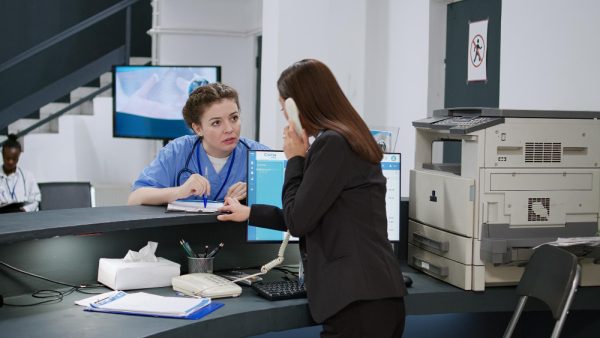 Medical receptionists serve as the backbone of healthcare facilities, creating the first impression patients receive when seeking care. The medical receptionist job description goes far beyond answering phones and scheduling appointments—they manage complex administrative tasks that keep medical offices running smoothly while ensuring patient satisfaction remains a top priority.
Medical receptionists serve as the backbone of healthcare facilities, creating the first impression patients receive when seeking care. The medical receptionist job description goes far beyond answering phones and scheduling appointments—they manage complex administrative tasks that keep medical offices running smoothly while ensuring patient satisfaction remains a top priority.
This comprehensive guide explores what makes a successful medical receptionist, outlining essential duties, required skills, and career prospects. Whether you’re considering this rewarding healthcare career or looking to hire your next medical receptionist, understanding these key responsibilities will help you navigate the hiring process with confidence.
Our Services
Virtual Medical Receptionists for Busy Healthcare Practices
Keep your clinic running smoothly with expert virtual receptionists managing calls, scheduling, and patient inquiries.
Medical Receptionist
A medical receptionist functions as the central hub of communication within a healthcare facility. They welcome patients upon arrival, manage patient information systems, and coordinate between healthcare providers and patients to ensure seamless office operations.
Medical receptionists play a crucial role in maintaining the professional atmosphere that patients expect from healthcare settings. They handle sensitive personal and financial information while providing excellent customer service that directly impacts patient care quality.
The median annual salary for medical receptionists varies by location and experience level, with opportunities for advancement within healthcare administration. Many professionals use this position as a stepping stone to other healthcare careers while gaining valuable experience in medical terminology and practice management software.
Medical Receptionist Duties

Core medical receptionist job description duties encompass both patient-facing and administrative responsibilities. These professionals manage the front desk operations that keep medical facilities functioning efficiently throughout each business day.
Primary responsibilities in a typical medical receptionist job description include greeting patients in a professional manner, verifying insurance information, and collecting patient charges. They also handle answering phone calls from patients seeking appointments, test results, or general medical office information.
Administrative tasks outlined in a medical receptionist job description often include managing patient records within electronic health records systems, filing paperwork, and maintaining confidentiality of sensitive medical information. Medical receptionists must address patient concerns promptly while protecting patients’ rights according to medical ethics standards.
Additional responsibilities involve coordinating with healthcare providers about patient appointments, managing treatment room utilization, and ensuring service delivery meets facility standards. They may also handle third-party claims processing and assist with reviewing service delivery compared to established benchmarks.
Medical Receptionist Job Responsibilities
Medical receptionist job responsibilities require balancing multiple priorities while maintaining excellent customer service standards. These professionals must communicate effectively with diverse patient populations while managing complex scheduling systems.
Scheduling appointments represents a significant portion of daily responsibilities. Medical receptionists coordinate patient appointments around provider availability, treatment requirements, and facility resources. This requires understanding medical terminology and treatment timeframes to optimize patients satisfaction.
Managing administrative tasks includes updating patient records, maintaining records accuracy, and retrieving patient records when requested by healthcare providers. They also handle patient inquiries about treatment information, billing questions, and office policies.
Customer service responsibilities extend to assisting patients with insurance verification, explaining treatment costs, and addressing service delays or scheduling conflicts. Medical receptionists must provide administrative support that enhances the overall patient care experience.
Medical Receptionist Responsibilities
The scope of medical receptionist responsibilities continues expanding as healthcare facilities implement new technologies and service delivery methods. These professionals adapt to changing practice management software while maintaining traditional patient care standards.
Patient-focused responsibilities include welcoming patients upon arrival, managing patient arrival documentation, and ensuring comfortable waiting room experiences. They coordinate patient flow between treatment areas while maintaining efficient office operations, which often includes scheduling appointments in a way that minimizes wait times and maximizes provider efficiency.
Record management responsibilities involve maintaining patient accounts, updating patient records with current information, and ensuring electronic health records remain accurate and accessible. This requires attention to detail and an understanding of health insurance requirements.
Communication responsibilities extend beyond answering phones to include effective communication skills with patients, providers, and insurance companies. Medical receptionists often serve as liaisons between different departments within larger healthcare facilities, especially when coordinating care or scheduling appointments that involve multiple providers or services.
Medical Receptionist Job

A medical receptionist job offers stable employment within the growing healthcare sector. These positions exist in various healthcare settings, from small private practices to large hospital systems, each offering unique challenges and opportunities.
The role requires managing patient records while providing exceptional customer service that reflects the medical facility’s values. Successful candidates demonstrate administrative skills combined with a genuine interest in patient care and healthcare operations, including key responsibilities such as scheduling appointments to ensure timely and efficient patient visits.
Medical receptionist positions often involve team effort coordination, working closely with nurses, physicians, and other administrative staff to ensure smooth daily operations. This collaborative environment provides opportunities to learn about different aspects of healthcare delivery.
Career advancement opportunities include specialization in specific medical fields, advancement to office management roles, or transitioning to other healthcare positions. The skills developed in medical reception roles—such as communication, organization, and scheduling appointments—transfer well to many healthcare administration careers.
Medical Receptionist Skills
Essential medical receptionist skills combine technical abilities with interpersonal competencies. Proficiency in practice management software and electronic health records systems forms the foundation for efficient administrative task completion.
Communication skills rank among the most critical abilities for medical receptionists. They must demonstrate effective communication skills when answering phone calls, addressing patient concerns, and coordinating with healthcare providers about patient care needs.
Administrative skills include accurate data entry, maintaining confidentiality, and managing multiple tasks simultaneously. Medical receptionists must handle clerical duties while providing excellent customer service that meets patient expectations.
Technical skills encompass understanding medical terminology, insurance procedures, and healthcare regulations. Familiarity with health insurance requirements and billing procedures helps medical receptionists assist patients with financial questions and payment arrangements.
Hiring Process
The hiring process for medical receptionist positions typically involves multiple evaluation stages designed to assess both technical competencies and interpersonal skills. Employers seek candidates who can balance administrative efficiency with compassionate patient care.
Initial screening often focuses on relevant experience in healthcare settings or customer service roles. Candidates should demonstrate familiarity with medical software, understanding of medical ethics, and ability to maintain patient confidentiality.
Interview processes frequently include scenario-based questions about handling patient concerns, managing difficult situations, and prioritizing multiple tasks. Employers evaluate candidates’ communication skills and their ability to provide excellent customer service under pressure.
Background checks and reference verification are standard due to the sensitive nature of patient information access. Many positions also require continuing education in medical terminology, privacy regulations, and practice management systems.
Fun Fact!
INTERESTING FACT
Even though receptionist jobs are declining overall, around 137,800 openings pop up each year—mainly because people are retiring or switching careers. So, there’s still plenty of room to step in and shine at the front desk!
Medical Receptionist Job Description
A comprehensive medical receptionist job description outlines specific expectations, required qualifications, and career development opportunities. These descriptions help both employers and candidates understand role expectations and success metrics.
Typical job descriptions emphasize the importance of providing excellent customer service while managing complex administrative tasks. They specify requirements for handling patient information, scheduling systems, and coordination with healthcare teams.
Qualification requirements often include high school completion, customer service experience, and basic computer skills. Many employers prefer candidates with healthcare experience or medical office training, though they may provide on-the-job training for motivated individuals.
Job descriptions should also outline advancement opportunities, continuing education expectations, and the supportive team environment that characterizes successful medical facilities. This helps attract candidates interested in long-term healthcare careers.
Customer Service Skills
 Outstanding customer service skills distinguish exceptional medical receptionists from adequate performers. These skills directly impact patient satisfaction and contribute to positive healthcare facility reputations within their communities.
Outstanding customer service skills distinguish exceptional medical receptionists from adequate performers. These skills directly impact patient satisfaction and contribute to positive healthcare facility reputations within their communities.
Patient interaction skills include active listening, empathy, and problem-solving abilities. Medical receptionists must address patient concerns while maintaining professional boundaries and following facility policies.
Conflict resolution skills help medical receptionists handle challenging situations, including service delays, billing disputes, and scheduling conflicts. They must remain calm and professional while finding solutions that satisfy both patients and facility requirements.
Multitasking abilities allow medical receptionists to manage phone calls, walk-in patients, and administrative tasks simultaneously without compromising service quality. This requires strong organizational skills and ability to prioritize competing demands.
Next Medical Receptionist
Finding your next medical receptionist requires careful consideration of both immediate needs and long-term facility goals. The right candidate will contribute to positive patient experiences while efficiently managing administrative responsibilities.
Successful medical receptionists demonstrate genuine interest in patient care combined with strong administrative capabilities. They adapt to new technologies while maintaining personal connections that make patients feel valued and respected.
Consider candidates who show potential for growth within your healthcare facility. Medical reception roles often serve as entry points for healthcare careers, making investment in employee development beneficial for both parties.
The healthcare industry continues evolving, making adaptability and learning orientation essential qualities for medical reception staff. Look for candidates who embrace change while maintaining focus on excellent patient care delivery.
Job Titles
Medical reception professionals work under various job titles that reflect their specific responsibilities and the healthcare settings where they’re employed. Understanding these distinctions helps both employers and job seekers identify appropriate opportunities.
Common job titles include Medical Receptionist, Healthcare Receptionist, Patient Services Representative, and Front Desk Coordinator. Each title may emphasize different aspects of the role while maintaining core administrative and patient service responsibilities.
Specialized titles such as Medical Office Assistant or Patient Account Representative may indicate additional responsibilities in billing, insurance processing, or clinical support. These positions often require additional training and offer higher compensation.
Career progression may lead to titles like Medical Office Manager, Patient Services Supervisor, or Healthcare Administrator. These advancement opportunities reward experienced medical receptionists who demonstrate leadership abilities and comprehensive understanding of healthcare operations.
Building Your Healthcare Career Foundation
VMeDx medical receptionist positions offer excellent entry points into the rewarding healthcare industry. These roles provide essential experience in patient care, medical terminology, and healthcare administration while contributing meaningfully to community health services.
Success in medical reception requires combining technical skills with genuine care for patient welfare. The most effective medical receptionists view their work as essential to positive healthcare outcomes, understanding that their professionalism and efficiency directly impact patient experiences.
Whether you’re seeking to hire exceptional medical reception staff or considering this career path yourself, focus on the combination of administrative excellence and patient-centered service that defines outstanding healthcare support professionals. Call us now to learn how VMeDx can support your healthcare staffing or career development needs.


